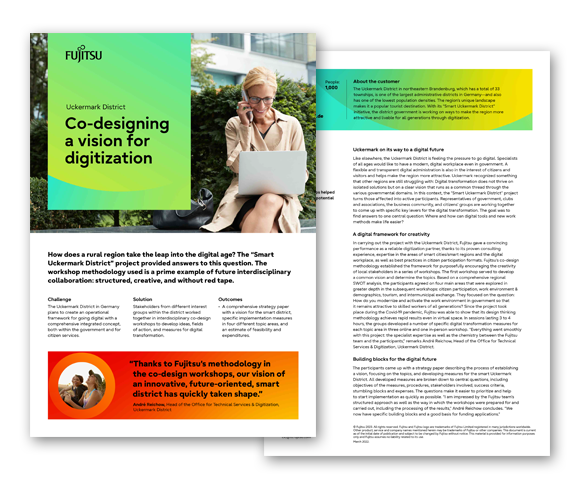How does a rural region take the leap into the digital age? The “Smart Uckermark District” project provided answers to this question. The workshop methodology used is a prime example of future interdisciplinary collaboration: structured, creative, and without red tape.
Challenge
The Uckermark District in Germany plans to create an operational framework for going digital with a comprehensive integrated concept, both within the government and for citizen services.
Solution
Stakeholders from different interest groups within the district worked together in interdisciplinary co-design
workshops to develop ideas, fields of action, and measures for digital transformation.
Outcomes
-
A comprehensive strategy paper with a vision for the smart district, specific implementation measures in four different topic areas, and an estimate of feasibility and expenditures.
Thanks to Fujitsu’s methodology in the co design workshops, our vision of an innovative, future-oriented, smart district has quickly taken shape.
André Reichow, Head of the Office for Technical Services & Digitization, Uckermark District

5 creative workshops helped raise the region’s potential for innovation.
- Industry: Public
- Location: Germany
- People: 1000
- Customer's website

About the customer
The Uckermark District in northeastern Brandenburg, which has a total of 33 townships, is one of the largest administrative districts in Germany—and also has one of the lowest population densities. The region’s unique landscape makes it a popular tourist destination. With its “Smart Uckermark District” initiative, the district government is working on ways to make the region more attractive and livable for all generations through digitization.
Uckermark on its way to a digital future
Like elsewhere, the Uckermark District is feeling the pressure to go digital. Specialists of all ages would like to have a modern, digital workplace even in government. A flexible and transparent digital administration is also in the interest of citizens and visitors and helps make the region more attractive. Uckermark recognized something that other regions are still struggling with: Digital transformation does not thrive on isolated solutions but on a clear vision that runs as a common thread through the various governmental domains. In this context, the “Smart Uckermark District” project turns those affected into active participants. Representatives of government, clubs and associations, the business community, and citizens’ groups are working together to come up with specific key levers for the digital transformation. The goal was to find answers to one central question: Where and how can digital tools and new work methods make life easier?
A digital framework for creativity
In carrying out the project with the Uckermark District, Fujitsu gave a convincing performance as a reliable digitization partner, thanks to its proven consulting experience, expertise in the areas of smart cities/smart regions and the digital workplace, as well as best practices in citizen participation formats. Fujitsu’s co-design methodology established the framework for purposefully encouraging the creativity of local stakeholders in a series of workshops. The first workshop served to develop a common vision and determine the topics. Based on a comprehensive regional SWOT analysis, the participants agreed on four main areas that were explored in greater depth in the subsequent workshops: citizen participation, work environment & demographics, tourism, and intermunicipal exchange. They focused on the question: How do you modernize and activate the work environment in government so that it remains attractive to skilled workers of all generations? Since the project took place during the Covid-19 pandemic, Fujitsu was able to show that its design thinking methodology achieves rapid results even in virtual space. In sessions lasting 3 to 4 hours, the groups developed a number of specific digital transformation measures for each topic area in three online and one in-person workshop. “Everything went smoothly with this project: the specialist expertise as well as the chemistry between the Fujitsu team and the participants,” remarks André Reichow, Head of the Office for Technical Services & Digitization, Uckermark District.
Building blocks for the digital future
The participants came up with a strategy paper describing the process of establishing a vision, focusing on the topics, and developing measures for the smart Uckermark District. All developed measures are broken down to central questions, including objectives of the measures, procedures, stakeholders involved, success criteria, stumbling blocks and expenses. The questions make it easier to prioritize and help to start implementation as quickly as possible. “I am impressed by the Fujitsu team’s structured approach as well as the way in which the workshops were prepared for and carried out, including the processing of the results,” André Reichow concludes. “We now have specific building blocks and a good basis for funding applications.”








